
Official Edgar Rice Burroughs Tribute and Weekly Webzine Site
Since 1996 ~ Over 10,000 Web Pages in Archive
Presents
Volume 5032

Official Edgar Rice Burroughs Tribute and Weekly Webzine Site
Since 1996 ~ Over 10,000 Web Pages in Archive
Presents
Volume 5032
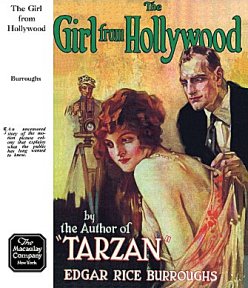
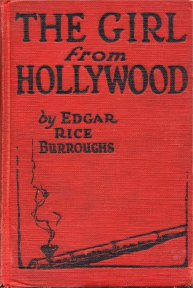
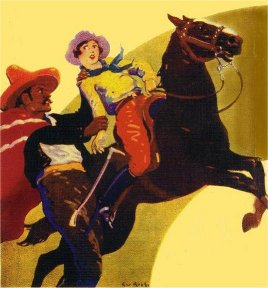
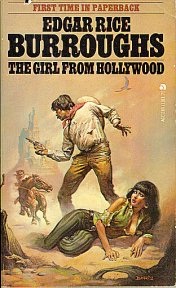
“Her mind is Tiffany twisted, she got the Mercedes bends
She got a lot of pretty, pretty boys she calls friends
How they dance in the courtyard, sweet summer sweat.
Some dance to remember, some dance to forget.”
– The Eagles, “Hotel California”The last time we left Shannon Burke, she was formulating a plan, a plan she wastes no time in working out. The first part of her plan is really stupid since she was so worried about Custer falling into the hands of the bootleggers because of what kind of men they were likely to be. What makes her think they will treat her differently? She must believe down deep in her heart that she can reason with these men. Self delusion is like that. Remember when President Bush looked into Putin’s eyes and saw a good soul? Hehehehe. That was a good one. Is Shannon facing the same?
CHAPTER NINETEEN
Shannon Burke did not ride to her home after she left Custer. She turned toward the the west at the road above the Evans place, continued on to the mouth of Horse Camp Canyon, and entered the hills. For two miles she followed the canyon trail to El Camino Largo, and there, turning to the left, she followed this other trail east to Sycamore Canyon. Whatever her mission, it was evident that she did not wish it known to the others. Had she not wished to conceal it, she might have ridden directly up Sycamore Canyon from Ganado with a saving of several miles.Can you guess what a fate worse than death was to a single woman in 1921? It can be summed up in one word: rape. Shannon knew that she could be raped by these men if she pursued her plan.
Presently she found what she sought – a trail running north and south across the basin. She turned Baldy into it, and headed him south toward the mountains. She was nervous and inwardly terrified, and a dozen times she would have turned back had she not been urged on by a power infinitely more potent than self-interest.
She had found what she sought, but the fear that rode her all but sent her panic-stricken in retreat. It was only the fact that she could not turn Baldy upon the narrow trail that gave her sufficient pause to gain mastery over the chaos of her nerves and drive them again into the fold of reason. It required a supreme effort of will to urge her horse onward again, down into that mysterious ravine, where she knew there might lurk for her a thing more terrible than death. That she did it bespoke the greatness of the love that inspired her courage.After what seemed a long time she rode out among splendid old oaks, in view of a soiled tent and a picket line where three horses and a half dozen burros were tethered. Nowhere was there sign of the actual presence of men, yet she had an uncanny feeling that they were there, and that from some place of concealment they were watching her. She sat quietly upon her horse for a moment, waiting.Wow, what a bold plan! She's hoping that her relationship with Allen will spare her any harm from these men. At the least, she could get gang banged. At the worst, a bullet in the head afterwards. The power of love has blinded her to reality.
Then, no one appearing, she called aloud.
“Hello, there! I want to speak with you.”
Her voice sounded strange and uncanny in her ears.
For what seemed a long time there was no other sound than the gently moving leaves about her, the birds and the heavy breathing of Baldy. Then, from the brush behind her, came another voice. It came from the direction of the trail down which she had ridden. She realized that she must have passed within a few feet of the man who now spoke.
“What do you want.”
“I have come to warn you. You are being watched.”
“You mean you are not alone? There are others with you? Then tell them to go away, for we have our rifles. We have done nothing. We're tending our bees – they're just below the ridge above our camp.”
“There is no one with me. I do not mean that others are watching you now, but that others know that you come down out of the hills with something each Friday night, and they want to find out what it is you bring.”
There was a rustling in the brush behind her, and she turned to see a man emerge, carrying a rifle ready in his hands. He was a Mexican, swarthy and ill favored, his face pitted by smallpox. Almost immediately two other men stepped from the brush at other points about the camp. The three walked to where Shannon sat upon her mount. All were armed, and all were Mexicans.
“What do you know about what we bring out of the hills? Should we not bring our honey out?” asked the pock-marked one.
“I know what you bring out,” she said. “I am not going to expose you. I am here to warn you.”
“Why?”
“I know Allen.”
Immediately their attitude changed. “You have seen Allen? You bring a message from him?”
“I have not seen him. I bring no message from him; but for reasons of my own I have come down to warn you not to bring down another load next Friday night.”It was the fear that Mexicans would rape white women while stoned on pot that spurred many of the State Legislatures in the American Southwest to pass laws against marijuana, which was widely used in most pain medications at the time. Laws related to racism are the hardest to repeal, and the laws against marijuana are long overdo for repeal, as the States of Washington and Colorado attest.
CHAPTER TWENTY
The pock-marked Mexican stepped close to Shannon and took hold of her bridle reins.Wow, the naivety of this woman in unbelievable! The Mexican leader is playing her like a Mariachi guitar.
“You think,” he said in broken English, “we are damn fool? If you do not come from Allen, you come for no good to us. You tell us the truth, damn quick, or you never go back to tell where you find us and bring policemen here!” His tone was ugly and his manner threatening.
“I have come to warn you because a friend of mine is going to watch for you next Friday night. He does not know who you are, or what you bring out of the hills. I do, and so I know that rather than be caught you might kill him, and I do not want him killed. That is all.”
“How do you know what we bring out of the hills?”
“Allen told me.”
“Allen told you? I do not believe you. Do you know where Allen is?”
“He is in jail in Los Angeles. I heard him telling a man in Los Angeles last July.”
“Who is the friend of yours that is going to watch for us?”
“Mr. Pennington.”
“You have told him about us?”“I have told you that he knows nothing about you. All he knows is that some one comes down with burros from the hills, and that they cut his fence last Friday night. He wants to catch you and find out what you are doing.” “Why have you not told him?” She hesitated.Yes, that's the spirit, Shannon – use these bad hombres to take care of Wilson Crumb.
“That can make no difference,” she said presently.
“It makes a difference to us. I told you to tell the truth, or –” The Mexican raised his rifle that she might guess the rest.
“I did not want to have to explain how I knew about you. I did not want
Mr. Pennington to know that I knew such men as Allen.”
“How you know about Allen?”
“That has nothing to do with it at all. I have warned you so that you can take steps to avoid discovery and capture. I shall tell no one else about you. Now let me go.”
She gathered Baldy and tried to rein him about, but the man clung to her bridle.
“Not so much of hurry, senorita! Unless I know how Allen told you so much, I cannot believe that he told you anything. The police have many ways of learning things – sometimes they use women. If you are a friend to Allen, all right. If you are not, you know too damn much for to be very good for your health. You had better tell me all the truth, or you shall not ride away from here – ever!”
“Very well,” she said, “I met Allen in a house in Hollywood where he sold his ‘snow’, and I heard him telling the man there how you disposed of the whisky that was stolen in New York, brought here to the coast in a ship, and hidden in the mountains.”
“What is the name of the man in whose house you met Allen?”
“Crumb.”
The man raised his heavy brows.
“How long since you been there – in that house in Hollywood?” “Not since the last of July. I left the house the same time Allen did.” “You know how Allen he get in jail?” the Mexican asked.
The girl saw that a new suspicion had been aroused in the man, and she judged that the safer plan was to be perfectly frank.
“I do not know, for I have neither seen Crumb nor Allen since: but when I read in the paper that he had been arrested that night, I guessed that Crumb had done it. I heard Crumb ask him to deliver some snow to a man in Hollywood. I know that Crumb is a bad man, and that he was trying to steal your share of the money from Allen.”Shannon's learning how easy it is to double-cross someone that is in your confidence. We also have the fact that Shannon refers to morphine as “snow,” demonstrating that the white powders were both cocaine and morphine – at least in Shannon's mind.
The man thought in silence for several minutes, the lines of his heavy face evidencing the travail with which some new idea was being born. Presently he looked up, the light of cunning gleaming in his evil eyes.Shannon will soon learn that no good deed goes unpunished. I must admit that I really like the way this story is constructed. So many people jump to the wrong conclusions! There is a real twist coming.
“You go now,” he said. “I know you! Allen tell me about you a long time ago. You Crumb's woman, and your name is Gaza. You will not tell anything about us to your rich friends the Penningtons – you bet you won't!” The Mexican laughed loudly, winking at his companions.
Shannon could feel the burning flush that suffused her face. She closed her eyes in what was almost physical pain, so terrible did the humiliation torture her pride, and then came the nausea of disgust. The man had dropped her reins, and she wheeled Baldy about.
“You will not come Friday night?” she asked, wishing some assurance that her sacrifice had not been entirely unavailing.
“Mr. Pennington will not find us Friday night, and so he will not be shot.”
She rode away then; but there was a vague suspicion lurking in her mind that there had been a double meaning in the man's final words.Custer Pennington, occupied in the office for a couple of hours after lunch, had just come from the house, and was standing on the brow of the hill looking out over the ranch toward the mountains. His gaze, wandering idly at first, was suddenly riveted upon a tiny speck moving downward from the mouth of a distant ravine – a moving speck which he recognized, even at that distance, to be a horseman, where no horseman should have been. For a moment he watched it, and then, returning to the house, he brought out a pair of binoculars. Now they were clearly revealed by the powerful lenses, the horse and its rider – Baldy and Shannon!ERB was always the jester. He wrote Tarzan of the Apes for seven hundred dollars. And do you really think Guy sold a story? Could he just be making up a reason for how he came about so much money? Seven hundred dollars was a lot of money in 1911 when ERB wrote Tarzan, and it must have been still good money in 1921. I wonder what kind of stories Guy wrote, anyway?
After a while he saw her emerge from Horse Camp Canyon and follow the road to her own place. Custer ran his fingers through his hair in perplexity. He was troubled not only because Shannon had ridden without him, after telling him that she could not ride that afternoon, but also because of the direction in which she had ridden – the trail of which he had told her that he thought it led to the solution of the mystery of the nocturnal traffic. He had told her that he would not ride it before Saturday, for fear of arousing the suspicions of the men he wished to surprise in whatever activity they might be engaged upon; and within a few hours she had ridden deliberately into the mountains on that very trail.
The more Custer considered the matter, the more perplexed he became. At last he gave it up in sheer disgust. Doubtless Shannon would tell him all about it when she called for her later in the afternoon. He tried to forget it; but the thing would not be forgotten.
Several times he realized, with surprise, that he was hurt because she had ridden without him. He tried to argue that he was not hurt, that it made no difference to him, that she had a perfect right to ride with or without him as she saw fit, and that he did not care a straw one way or the other.
Yet, argue as he would, the fact remained that it had made a difference, and that he was considering Shannon now in a new light. Just what the change meant he probably could not have satisfactorily explained, had he tried; but he did not try. He knew that there was a difference, and that his heart ached when it should not ache. It made him angry with himself, with the result that he went to his room and had another drink.
Shannon, too, felt the difference. She thought that it was her own guilty conscience, though why she should feel guilt for having risked so much for his sake she did not know. Instinctively she was honest, and so to deceive one who she loved, even for a good purpose, troubled her.
At dinner that night Eva was unusually quiet until the Colonel, noticing it, asked if she was ill.
“There!” she cried. “You all make life miserable for me because I talk too much, and then, when I give you a rest, you ask if I am ill. What shall I do? If I talk, I pain you. If I fail to talk, I pain you; but if you must know, I am too thrilled to talk just now – I am going to be married!”
“All alone?” inquired Custer.
Guy grinned sheepishly, and was about to venture an explanation when Eva interrupted him. The others at the table were watching the two with amused smiles.
“You see, momsy,” said Eva, addressing her mother, “Guy has sold a story. He got a thousand dollars for it – a thousand!”
“Well, it was nearly a thousand – if it had been three hundred dollars more it would have been – and so now that our future's assured we are going to be married. I hadn't intended to mention it until Guy had talked with popsy, but this will be very much nicer, and easier for Guy.”They were all laughing now, including Eva and Guy. The tears were rolling down Custer's cheeks.Well, maybe Guy really did sell a story. If he didn't, he would be sure to be caught out eventually, for no one would be able to buy a magazine with one of his stories in it. Did he write pulp fiction, or literature in a more serious vein? He could have written Westerns like Zane Grey, whom ERB idolized.
“That editor was guilty of grand larceny when he offered you seven hundred berries for the story. Why the gem alone is easily worth a thousand. Adieu, Mark Twain! Farewell, Bill Nye! You've got ‘em all nailed to the post, Guy Thackeray!”
The Colonel wiped his eyes.
“I gather,” he said, “that you two children wish to get married. Do I surmise correctly?”
“Oh, popsy, you're just wonderful!” exclaimed Eva.
“Yes, how did you guess it, father?” asked Custer. “Marvelous deductive faculties for an old gentleman, I'll say!”
“That will be about all from you, Custer,” admonished the Colonel.
“Any time that I let a chance like this slip!” returned the young Pennington. “Do you think I have forgotten how those two imps pestered the life out of Grace and me a few short years ago? Nay, nay!”
“I don't blame Custer a bit,” said Mrs. Evans. “Guy and Eva certainly did make life miserable for him and Grace.”
“That part of it is all right – it is Guy's affair and Eva's; but did you hear him refer to me as an old gentleman?” They all laughed.
“But you are a gentleman,” insisted Custer.
The Colonel, his eyes twinkling, turned to Mrs. Evans.
“Times have changed, Mae, since we were children. Imagine speaking thus to our fathers!”
“I'm glad they have changed, Custer. It's terrible to see children afraid of their parents. It has driven so many of them away from home.” “No danger of that here,” said the Colonel.
“It is more likely to be the other way around,” suggested Mrs. Pennington. “In the future we hear of parents leaving home because of the exacting tyranny of their children.”
“My children shall be brought up properly,” announced Eva, “with proper respect for their elders.”
“Guided my the shining example of their mother,” said Custer.
“And their Uncle Cutie,” she retorted.
“Come now,” interrupted the Colonel, “let's hear something of your plans. When are you going to be married?”
“Yes,” offered Custer. “Now that the seven hundred dollars has assured their future, there is no reason why they shouldn't be married at once and take a suite at the Ambassador. I understand they're as low as thirty-five hundred a month.”
“Aw, I have more than the seven hundred,” said Guy. “I've been saving up for a long time. We'll have plenty to start with.”Everyone knows who Mark Twain was, but I was clueless about Bill Nye. I googled his name and only got a thousand hits for Bill Nye, the Science Guy, who was born in 1955, five years after ERB died. I made a more specific search: “19th century author bill nye”, and got an immediate hit. He was a widely read humorist and journalist in the midwest between 1850 and 1896.
Shannon noticed that he flushed just a little as he made the statement, and she alone knew why he flushed. It was too bad that Custer's little sister should start her married life on money of that sort!Is she kidding? What sort of money did she use to give her mother for the purchase of the orchard? What a hypocrite!Shannon felt at heart Guy was a good boy – that he must have been led into this traffic without any adequate realization of its criminality. Her own misfortune had made her generously ready to seek excuses for wrongdoing in others; but she dreaded to think what it was going to mean to Eva and the other Penningtons if ever the truth became known. From her knowledge of the sort of men with whom Guy was involved, she was inclined to believe that the menace of exposure or blackmail would hang over him for many years, even if the former did not materialize in the near future; for authorities, they would immediately involve him, and would try to put the full burden on responsibility upon his shoulders.Boy, wouldn't I have liked to have a father-in-law like that. My father-in-law was a Colorado cowboy who settled in San Diego after WWII. He had been in the Navy and when he was discharged, he stayed and made a lot of money as a contractor. He made me frame a house with him and his crew in order to raise the money I needed to move from East La Jolla to Fresno in August 1980.
“I don't want the financial end of matrimony to worry either of you,” the Colonel was saying. “Guy has chosen a profession in which it may require years of effort to produce substantial returns. All I shall ask of my daughters husband is that he shall honestly apply himself to his work. If you do your best, Guy, you will succeed, and in the meantime I'll take care of the finances.”Let me tell you, that was hard work. I was a novice and his crew worked the hell out of me in 100 degree weather under the Fallbrook sun. One thing I excelled in his eyes was my ability to hammer a nail with both my right hand and left. It was nothing to me, but he really admired that gift. As he got older he was less nimble and fell from three stories on a hotel project. He never fully recovered and his mind grew feeble before he died. My ex-wife's sister went through his big house on the hill for years searching for his Krugerrand collection of gold coins, but she never found them and then the house burned down. I suspected the sister of arson, but the cops never did.
Enough of the humorous dinner table banter that ERB must have really enjoyed writing, since his own household was the inspiration for it. In our next installment, the plot will definitely thicken.
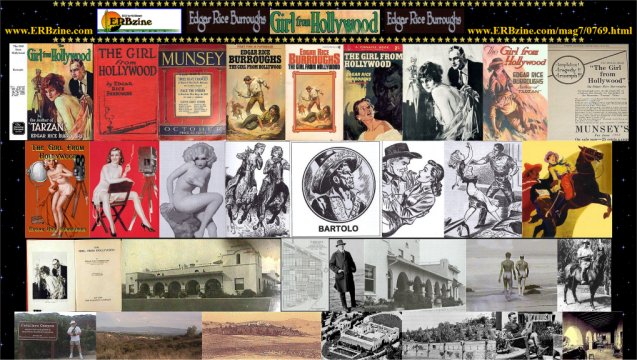
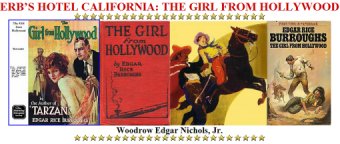
Read
The
Girl From Hollywood Text in ERBzine
See
the ERBzine Bibliography Entry
BACK TO EDGAR RICE
BURROUGHS' TARZANA RANCH 1921 - Docu/Novel
.
![]()
INTRODUCTORY AND CONTENTS PAGE
FOR
THE EDGAR RICE BURROUGHS ARTICLES
BY WOODROW EDGAR NICHOLS, JR.
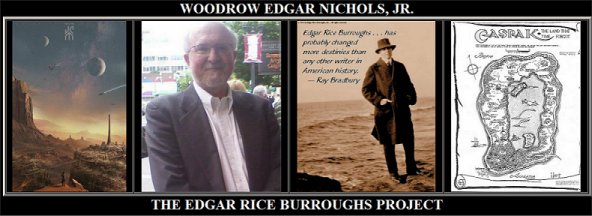
www.ERBzine.com/nichols
|
|
THE TRIMESTERS OF CASPAK |
|
by Woodrow Edgar Nichols, Jr. INTRODUCTION and CONTENTS |
![]()

![]()

BILL
HILLMAN
Visit
our thousands of other sites at:
BILL
AND SUE-ON HILLMAN ECLECTIC STUDIO
All
ERB Images© and Tarzan® are Copyright ERB, Inc.- All Rights Reserved.
All
Original Work © 1996-2014 by Bill Hillman and/or Contributing Authors/Owners
No
part of this web site may be reproduced without permission from the respective
owners.